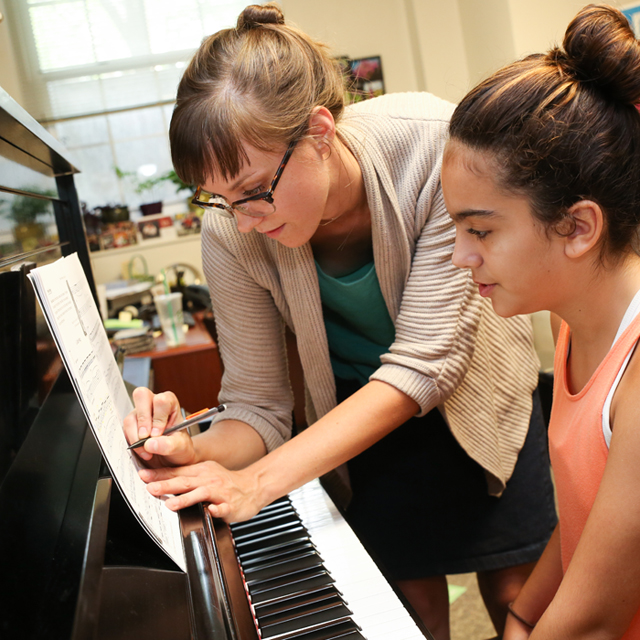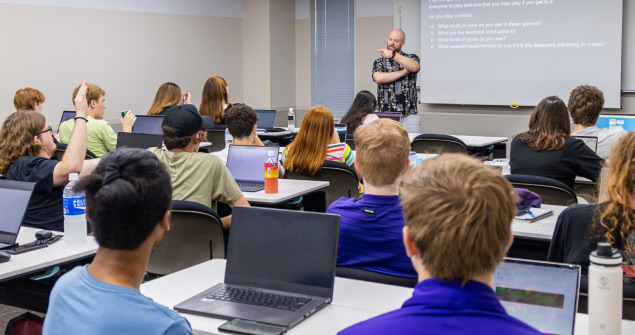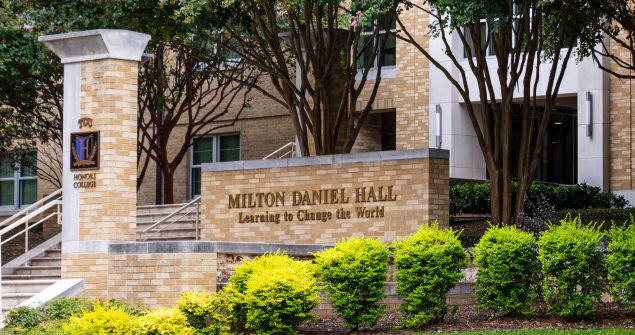Piano Pedagogy
If teaching is your passion, consider a degree in piano pedagogy.

No musical instrument has played a greater role in the human experience than the piano. Since 1700, it has brought music to life inside homes and concert halls, thanks to those who choose to teach the combination of theory, technique, style and creativity that is piano pedagogy.
As a piano pedagogy student, you’ll combine extensive coursework with hands-on teaching experience. You’ll learn how to break down technique, explain music theory and create fun, effective lesson plans to help others grow as musicians as you develop teaching skills throughout your course of study.
Contact
- Ann M. Gipson
Division Chair, Piano
Director of Piano Pedagogy Studies
Associate Professor of Piano
a.gipson@tcu.edu
817-257-6312 - music@tcu.edu
817-257-7232
Programs Offered
Sample Courses
- Group Piano Pedagogy
- Educational Psychology
- Philosophy of Music Education
- Current Trends and Research in Piano Pedagogy
View Courses & Degree Requirements

Core Curriculum
Your success is at our Core. TCU’s Core Curriculum prepares you to live and work in today’s ever-evolving diverse and global society. It encourages you to be intellectually curious and ask big questions about the world and your place in it.
Special Admission Requirements
For undergraduates and graduates wanting to attend the TCU School of Music, there is an admissions process. Learn more about the audition requirements.
Our Faculty
You’ll learn from faculty who are highly experienced performers and music educators. They’re passionate about guiding the next generation of piano teachers through lessons, classroom instruction and hands-on teaching experiences.
What Sets Us Apart
At TCU, we offer valuable hands-on experience. Undergraduate and graduate piano pedagogy students teach pre-college students enrolled in the Pedagogy Laboratory Program, a two-year program of beginning piano instruction combining both class and private instruction.
Graduate students also teach college-level piano classes, non-music major piano classes, adult hobby piano classes and college students studying piano as an elective.
Your piano pedagogy professor will work with you to choose the right combination of courses and mentor you so you can reach your goals.
Career Prospects
A degree in piano pedagogy prepares you for a meaningful and flexible career. You can run your own teaching studio, work in schools or community music programs or even go on to graduate school. Some graduates also perform, compose or work in music education leadership.
Related Academic Programs
- Arts Leadership & Entrepreneurship Minor
- Brass
- Collaborative Piano
- Conducting
- Music
- Music Education
- Music Theory & Composition
- Musicology
- Organ & Church Music
- Percussion
- Piano
- Strings
- Voice
- Woodwinds

John V. Roach Honors College
Exceed your own expectations. Incoming and current undergraduate students of every major may apply. Unique classes are offered which connects students with a varied curriculum that is stimulating, supportive and cross-disciplinary.